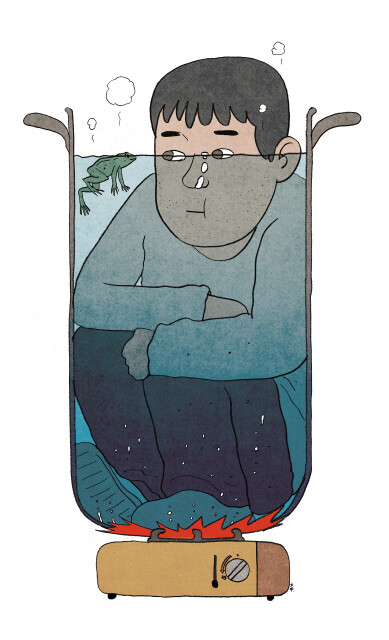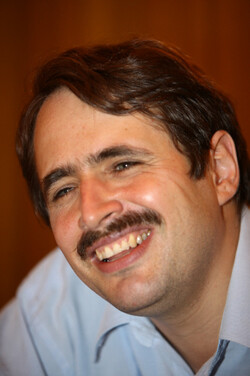hankyoreh
Links to other country sites 다른 나라 사이트 링크
[Column] “Hell Joseon” -- a country where sleepless toil brings no mobility

In Chinese and traditional Korean society, state officials used to go around collecting the songs the masses sang. They saw folk songs as an expression of folk feeling, and they tried to use them to find out what people were feeling. These days, the best way to read the minds of young people may be to look at the new words they come up with. So perfectly do they capture the characteristics of a society that they often enter nationwide parlance once shared through the media. The word wangtta, commonly used in Korea to refer to an outsider or a victim of exclusion by their peers, was first introduced by middle and high school students in the mid-1990s; it did such an excellent job of expressing a very negative aspect of Korean “organizational culture” that it is now in wide use among adults as well. It’s by looking at such terms that we can figure out where we stand today.
So what impressions do we get from looking at the coinages that are popular among young people today? There’s the sampo sedae, or “generation of three giving-ups,” referring to young people who feel compelled to give up dating, marriage, and children. There’s the opo sedae, or “five giving-ups,” which takes the same three and adds employment and home ownership. The chilpo sedae (“seven giving-ups”) further includes interpersonal relationships and hope. Yeongpoja are teenagers and twentysomethings who have given up on English studies. Slightly older terms include Itaebaek, play on the Korean name of Chinese poet Li Po that stands for “unemployed for most of your twenties,” and inguron, which sounds like “population theory” but really means “ninety percent of humanities graduates end up jobless.”
As a university instructor who feels he has to share terms like these with foreign students to help them understand where South Korean society stands today, even hearing words like these leaves me in a mood of despair and torpor.
The theme of “despair” seems to run through the coinages by South Korea’s younger population. Perhaps the ultimate example is “Helljoseon,” or “Hell Korea.” The use of the English word “Hell” emphasizes its modern context, but the use of “Joseon” - a reference to the past dynasty that ruled the peninsula for five centuries until the late 1800s - instead of “Korea” alludes to a regressive society where the inheritance of status is almost fully institutionalized. It says that we’ve created a society like the one that existed 150 years ago, where the children born to the powerful families of Bukcheon village in Joseon-era Hanyang grew up with a silver spoon in their mouth. Only this time it‘s the Gangnam families who have formed an exclusionary, hereditary caste of their own in terms of where they live, whom they marry, how and where they study (here and abroad), what language they speak (preferably English), and what “well-being” practices they adopt.
The concept of Hell Joseon represents the mid-2010s. A century earlier, when speaking of imperial Russia, Vladimir Lenin referred to the Russian Empire as the “weakest link” of the imperial world. Despite having become a “world power,” the common people were more deprived than ever, and Russian imperial society was more complicated and rife with contradictions. Lenin understood that the world’s superpowers are the countries most susceptible to implosion. On the surface, today’s Republic of Korea (based on nominal GDP) is the world’s thirteenth largest economy and fifth biggest exporter, with the seventh most powerful military. In many ways, it can be considered a world power in its own right. However, a glimpse of the lives of average citizens reveals otherwise.
South Korea may have entered the Organisation for Economic Cooperation and Development (OECD), basically a club of relatively wealthy countries, but just as 70 percent of Russians were illiterate during the days of imperial Russia - as opposed to their well-educated counterparts in France or Germany - South Korea’s social progress index varies greatly from that of its OECD peers. For instance, South Korea’s social spending accounts for 10.4 percent of its GDP, making it mid- to lower-range among OECD rankings. While such spending rose one percent every two years under the Kim Dae-jung and Roh Moo-hyun administrations, it’s been stagnant since the Lee Myung-bak era. It’s probably obscene to compare such numbers to those of France (31.9 percent) or Poland (31 percent), but South Korea still falls short of countries such as Estonia (16.3), despite having a larger economy, qualifying it as an economic power that lacks social welfare.
True, comparative tax rates based on GDP (currently 24 percent) are nearly half those of France or Poland, but South Korea’s taxation laws, instead of benefitting young earners who literally have no money to give, are designed specifically for the elite clans of the Gangnam district, which may as well be its own city. A skewed tax system and no social benefits have resulted in suicide and birth rates that are among the worst and lowest in the world, which have contributed to the OECD’s lowest indexes for subjective happiness and well-being. Such indicators, what the OECD calls the Better Life Index, are based on more than just subjective “feelings,” incorporating various physical factors as well. For instance, South Korea’s average sleep time (7 hours, 49 minutes) is a whole hour less than that of France, making it among the shortest in OECD rankings. Doesn’t a place where people can‘t even get good night’s rest qualify as a “living hell?”
Just as the mighty armies of imperial Russia juxtaposed severely with the starving masses they supposedly protected, the dazzling lights of South Korea’s “economic power” status fail to illuminate struggling workers supporting the country’s production pyramid, independent business owners, and the impoverished class. In standard neoliberal economies, it’s usually adults who are immersed limitless competition, but in South Korea’s cemented social class built on a system of academic privilege, children are thrown into a blood-thirsty competition for academic capital from the moment they step into preschool. Children are essentially robbed of their childhood, while adults spend an average of 240,000 won per child (about US$206, for elementary, middle, and high school) on private education, paying what‘s essentially a private-education tax, even if that means going into debt or working oneself sick through two jobs. South Korea’s average monthly expenditure per child on private education significantly surpasses that of its wealthier neighbor Japan (150,000 won). Isn‘t such a system, where the winners are basically born, where those guilty of being born into the “losing class” drive themselves into debt and sickness in endless competition - isn’t this basically a living hell?
However, the similarities between imperial Russia and South Korea end at the imbalance between world-power status and truly atrocious levels of social well-being. In 1905, the Russian Empire underwent a revolution unlike anything the world had ever witnessed, but South Korea simply becomes more conservative as time goes on. Those upset with Hell Joseon usually discuss emigrating elsewhere or simply sigh at their doomed “fate”; there are no dreams of leading a modern Donghak Revolution, a peasant revolt that ended the Joseon Dynasty.
The solution of emigration, basically a keyword among today’s youth, the dream of moving to a wealthier country and competing in a market where income distribution is a little better - in other words, a place less cutthroat and more fair than South Korea - is an extremely conservative one. While skilled male workers of massive factories in 1917 Russia supported the Bolsheviks, skilled organized laborers in today’s South Korean factories not only fail to discern the fundamental problems of modern capitalism, they often refuse to support the movements of irregular workers. Why have people living underneath Hell Joseon become so complacent?
There is no simple answer to this question. There are so many factors driving today‘s South Korean youth into despair, rather than organized resistance. For instance, disappointment in the mainstream reformist party, often simply labeled as “leftists,” plays a big part. Support for Roh Moo-hyun and Moon Jae-in among voters in the 20s and 30s during the presidential elections of 2002 and 2012 was 59 and 64 percent, respectively, but has the opposition party really earned his support by fighting for a world where companies can’t exploit irregular workers? The emergence of the “880,000 won generation,” a class of young workers rattled by an unstable job market (who earn around 880,000, or US$750, per month), seems to resemble South Korean society around the time Roh Moo-hyun stepped into office.

Perhaps the biggest factor of all, however, is the myth they‘ve been fed concerning economic growth. While they may be unemployed, support from their parents, a generation that has attained a level of financial stability amid South Korea’s economic growth, prevents today‘s youth from falling into stark poverty. Thus, they still harbor hopes for the current system under the belief that hard work will solve everything, and easily blame themselves for their troubles. As stagnant growth is a relatively recent phenomenon, there is still a lot of hope for growth in the future. After a few more years of confirming that average workers can never truly prosper in an economy controlled by the elite class, no matter how much the country exports - only then will the victims of Hell Joseon realize that change lies within social movement.
By Park No-ja, Professor of Korean studies at the University of Oslo, Norway
The views presented in this column are the writer’s own, and do not necessarily reflect those of The HankyorehPlease direct questions or comments to [english@hani.co.kr]

Editorial・opinion
![[Column] Has Korea, too, crossed the Rubicon on China? [Column] Has Korea, too, crossed the Rubicon on China?](https://flexible.img.hani.co.kr/flexible/normal/500/300/imgdb/original/2024/0419/9317135153409185.jpg) [Column] Has Korea, too, crossed the Rubicon on China?
[Column] Has Korea, too, crossed the Rubicon on China?![[Correspondent’s column] In Japan’s alliance with US, echoes of its past alliances with UK [Correspondent’s column] In Japan’s alliance with US, echoes of its past alliances with UK](https://flexible.img.hani.co.kr/flexible/normal/500/300/imgdb/original/2024/0419/2317135166563519.jpg) [Correspondent’s column] In Japan’s alliance with US, echoes of its past alliances with UK
[Correspondent’s column] In Japan’s alliance with US, echoes of its past alliances with UK- [Editorial] Does Yoon think the Korean public is wrong?
- [Editorial] As it bolsters its alliance with US, Japan must be accountable for past
- [Guest essay] Amending the Constitution is Yoon’s key to leaving office in public’s good graces
- [Editorial] 10 years on, lessons of Sewol tragedy must never be forgotten
- [Column] A death blow to Korea’s prosecutor politics
- [Correspondent’s column] The US and the end of Japanese pacifism
- [Guest essay] How Korea turned its trainee doctors into monsters
- [Guest essay] As someone who helped forge Seoul-Moscow ties, their status today troubles me
Most viewed articles
- 1[Column] The clock is ticking for Korea’s first lady
- 2Hong Se-hwa, voice for tolerance whose memoir of exile touched a chord, dies at 76
- 3After 2 months of delayed, denied medical care, Koreans worry worst may be yet to come
- 4[Column] Has Korea, too, crossed the Rubicon on China?
- 5US overtakes China as Korea’s top export market, prompting trade sanction jitters
- 6Samsung barricades office as unionized workers strike for better conditions
- 7All eyes on Xiaomi after it pulls off EV that Apple couldn’t
- 8[Correspondent’s column] In Japan’s alliance with US, echoes of its past alliances with UK
- 975% of younger S. Koreans want to leave country
- 10[Correspondent’s column] The US and the end of Japanese pacifism